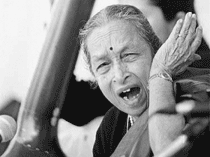 Her mother sacrificed her own music so that the Carnatic style should not interfere with her daughter’s chosen Hindustani style. Gangubai received early training from Shri Dattopant Desai and Shri Krishnacharya before becoming a disciple of Sawai Gandharva. Her early days were full of financial hardships. She recollects, in an interview, how Abdul Karim Khan once heard her sing and encouraged her, saying “Dekho beti, khoob khana, khoob gana” (Eat heartily, sing heartily); with a wry humour which never deserted her, she told her interviewer, “Where was the food? There was only music…!” Her powerful voice (which became deep and ‘masculine’ following a tonsil operation) emerged from her frail and slight form.
Her mother sacrificed her own music so that the Carnatic style should not interfere with her daughter’s chosen Hindustani style. Gangubai received early training from Shri Dattopant Desai and Shri Krishnacharya before becoming a disciple of Sawai Gandharva. Her early days were full of financial hardships. She recollects, in an interview, how Abdul Karim Khan once heard her sing and encouraged her, saying “Dekho beti, khoob khana, khoob gana” (Eat heartily, sing heartily); with a wry humour which never deserted her, she told her interviewer, “Where was the food? There was only music…!” Her powerful voice (which became deep and ‘masculine’ following a tonsil operation) emerged from her frail and slight form. Being born in a low caste and being born a woman put her in a doubly marginalised situation. She once narrated how as an 11-year-old she was part of a group which sang a welcome song at the Belgaum Indian National Congress in 1924 and she was elated to be singing in front of Gandhiji. But at the meal which followed, she was full of fear that as she was of a low caste, she would be asked to clean up after the upper castes had eaten. When asked by her guru to eat with the others, she was so mortified that she could barely raise her head. She spoke of how the Brahmin households in her native Dharwad’s Shukravaradapete were outraged when a ‘singer’s daughter’ dared to enter their orchard, and what’s more, steal mangoes. “The very same people now invite me to their houses and spread a lavish lunch for me,” she said.
Gangubai commented on the entrenched gender bias in the world of music: “A male musician will become an ustad or a pandit, but a female musician, even one of the calibre of Kesarbai or Mogubai, will always remain a bai!” As a woman, she never had the luxury of “being lost in the art of creation”. She said in an interview, “Peace of mind is very essential in anything that you do—particularly in music. But in my case, it was just the opposite. What new things could I learn when I was constantly disturbed and unhappy? This whole concept of getting lost in music and forgetting the world around you, is a myth.” Many women writers have similarly produced their creative work in struggle against the lack of privacy and economic and social security: Kamala Das wrote at the kitchen table after her family had slept; Jane Austen is said to have had to hide her writing under blotting paper when anyone entered the room; Charlotte Bronte, George Eliot and many others wrote under male pseudonyms.